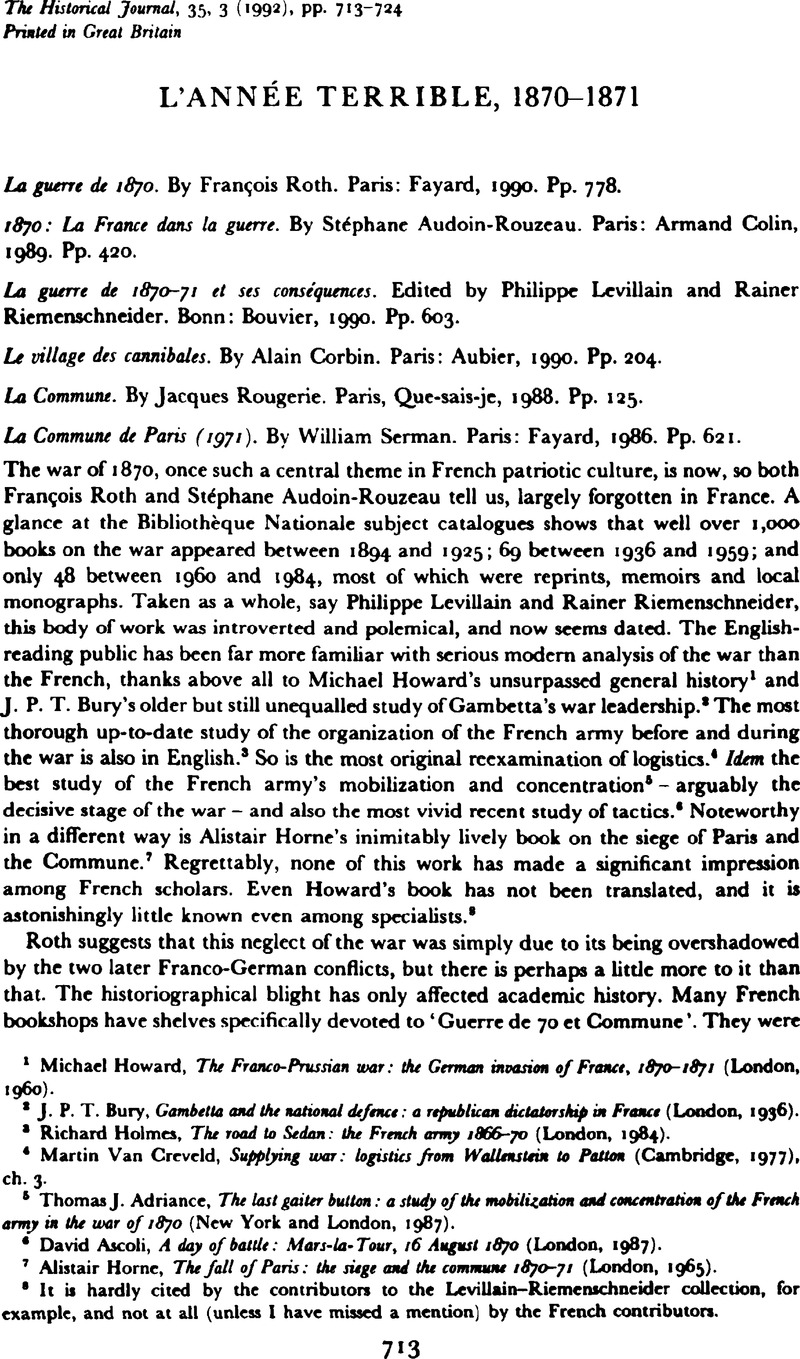Published online by Cambridge University Press: 25 March 2010

1 Howard, Michael, The Franco-Prussian war: tht German invasion of France, 1870–1871 (London, 1960)Google Scholar.
2 Bury, J. P. T., Gambetta and tht national defence: a republican dictatorship in France (London, 1936)Google Scholar.
3 Holmes, Richard, The road to Sedan: the French army 1866–70 (London, 1984)Google Scholar.
4 Crcvcld, Martin Van, Supplying war: logistics from Walltnstein to Potton (Cambridge, 1977), ch. 3Google Scholar.
5 Adriance, Thomas J., The last gaiter button: a study of the mobilization and concentration of the French army in the war of 1870 (New York and London, 1987)Google Scholar.
6 Ascoli, David, A day of battle: Mars-la-Tour, 16 August 1870 (London, 1987)Google Scholar.
7 Home, Alistair, The fall of Paris: the suge and the commune 1870–71 (London, 1965)Google Scholar.
8 It is hardly cited by the contributors to the Levillain-Riemenschneider collection, for example, and not at all (unless I have missed a mention) by the French contributors.
9 For example, Guillemin, Henri, in the significantly titled Les Origvus de la Commune, 3 vols. (Paris: 1956-1960)Google Scholar.
10 See below n. 34.
11 How much the more regrettable that the Fayard series, which includes the works of Roth and Serman, has no Footnotes.
12 Road to Sedan, ch. 3, which suggests that above all the French relied on an experience of war that was no longer valid.
13 Last gaiter button, p. 141.
14 Capt. Patry, Léonce, La guerre telle qu'elle est (Paris, 1897), p. 69Google Scholar.
15 Moltke's military correspondence 1870–71 (Oxford, 1923), 1, 25, 34Google Scholar.
16 Jules Favre's account, quoted in , Howard, Franco-Prussian war, p. 251Google Scholar.Busch, Moritz, in Bismarck: some secret pages of his history (3 vols., London 1898), I, 498–9,Google Scholar gives a slightly different version of the exchange.
17 Lehautcourt, Pierre, Süge de Paris: Buzenoat à la capitulation (4 décembre 1870–29 Janvier 1871) (Paris and Nancy, 1898), p. 292Google Scholar.
18 Becker, Jean-Jacques, Les Fraafais dans la grande gutrre (Paris, 1980)Google Scholar.
19 Audoin-Rouzeau, Stéphane, 14–18: Les combattants dts tranckées (Paris, 1986)Google Scholar.
20 Not an organization dedicated to research on Thiers, but based in his house and library in Paris, bequeathed to the French Institute.
21 Lcvy-Leboyer, Maurice and Bourguignon, Francois, The French uonomy in the nineteenth Century (Cambridge, 1990), pp. 243–7Google Scholar.
22 Papicrs Thiers, Bibliothèque Nationale, n.a.fr. 20620 fo. 67.
23 Ibid. 20618 fol. 603.
24 Louis Chevalier made a similar point with reference 10 the removal of public executions from the centre to the outskirts of Paris in 1832. Labouring classes and dangerous classes during the first the nineteenth century (London, 1973), pp. 83–8Google Scholar.
25 Among the most important are ‘Composition d'une population insurgée: l'exemple de la Commune’, Mouvement Social (July-Sept. 1964), and ‘L'AIT et le mouvement ouvrier à Paris pendant les evenements de 1870–1871’ in Rougerie, J. (ed.), 1871: falons pour une histoire de la Commune de Paris (Paris, 1973), pp. 3–102Google Scholar.
26 E.g. Gaillard, Jeanne, Communes de province, Comimmt de Paris, 1870–1871 (Paris, 1971)Google Scholar.
27 Dalotel, Alain, Faure, Alain and Freicrmuth, J.-C., Aux Origines de la Commune: le mouvement des réunions publiques à Paris, 1868–1870 (Paris, 1980)Google Scholar.
28 Fiaux, Louis, Histoire de la Guerre civile de 1871 (Paris, 1879)Google Scholar.
29 Paz, Maurice, ‘Lc my the dc la Commune, les deux reproches majeurs’, Est it Ouest, 482 (02 1972). 23–8Google Scholar.
30 See for example Schulkind, Eugene, ‘Socialist women in the 1871 Paris Commune’, Past and Present, 106 (02 1985), 124–63CrossRefGoogle Scholar.
31 Marion, Olivier, ‘La vie religieuse pendant la Commune de Paris 1871’ (unpublished maltrisc dissertation, University de Paris X Nanterre, 1981), pp. 105–6Google Scholar.
32 Quoted in Tombs, Robert, The war against Paris 1871 (Cambridge, 1981), p. 113Google Scholar.
33 In , Levillain and , Ricmcnschneider, La Guerre, pp. 18–19Google Scholar.
34 Among several interesting contributions in Levillain and Riemenschneider, La Guerre, see especially Groh, Dieter, ‘La guerre et les convictions politiques en Allemagne entre 1870 et 1914’, pp. 431–50Google Scholar, and Amalvi, Christian, ‘La défaite “mode d'emploi”’, pp. 451–8.Google Scholar On the broad ideological and political consequences of the war there is a vast literature, notably the classic works by Halévy, Daniel, La Fin des notables (2 vols, Paris, 1930-1937)Google Scholar;Digeon, Claude, La Crise allemande de la pense'e françaue, 1870–1914 (Paris, 1959)Google Scholar;Girardet, Raoul, Le Nationalisme français, 1871–1914 (Paris, 1966)Google Scholar; and Contamine, Henry, Le Revanche, 1871–1914 (Paris, 1957)Google Scholar; and such more recent works as Dupuy, A., Sedan et l'enseignement de la revanche (Paris, 1975),Google ScholarMitchell, Allan, The German influence in France after 1870 (Chapel Hill, 1979), and articles and unpublished dissertations too numerous to listGoogle Scholar.